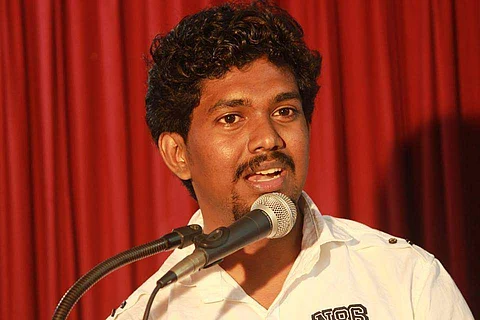

It was almost impossible to begin the conversation with Dinu K without asking him a cliched question — How can one be an activist, without compromising on their academics. There were reasons. He scored the highest marks in this year's MA Sociology final year examinations conducted by the Sree Sankaracharya University of Sanskrit, Kalady. A prominent Dalit activist, he is also the co-founder of Disha, a welfare organistaion.
But for Dinu, education is an important aspect of his activism. "For an Ambedkarite like me, education is also part of my activism," he says. The results weren't unexpected for Dinu who has been quite consistent in scoring good grades, throughout his school and college life. "I studied sociology and sociological imagination is necessary here. So, my activism helped me write my exams well. It also helped my critical thinking ability a lot. Also, talking to people from different backgrounds about the issues that they face helped me expand my worldview," he says.
Dinu is not your regular activist whom you would find on the streets conducting marches and shouting loud slogans. He rather believes in peaceful constitutional remedies. "I never supported protests that interrupted education. I will never compromise on education. That is the only way out for us. Also, I don't participate in provocative marches," he says. "A Dalit man like me cannot risk getting arrested. There is no one to bail us out," he adds.
Excerpts from our conversation:
What was it that brought out the activist in you?
During my school days, I was active in Kudumbashree Mission's children's initiative Balasabha. For a cis-male like me, this was quite helpful in identifying gender inequality. Being around a large group of women helped me become empowered, empathetic and not be toxic masculine.
When were you introduced to Ambedkarism?
After dropping out of IIT Madras, where I studied Humanities and Social Science, I joined Farook College in Kozhikode. There, I was a liberal without a clear identity. I was suspended once for speaking up against the gender biases that existed there. The college administration never allowed men and women to freely interact and take part in events together. They weren't ready to revoke my suspension if I didn't apologise. I wasn't ready to do that. That was when a group of Dalit delegates including author Dr Rekha Raj came in my support. I had long conversations with them about the principles of Ambedkarism, which was indeed an eye-opener. Until then, I always felt suffocated in this society. I sought therapy, when I was in Chennai, I thought I was homesick. But an introduction to Ambedkarism helped me assert my identity. After this issue, I had to go to court to get permission to continue my education.
Last year, you were harassed by a few policemen who you said yelled casteist slurs at you, when you were coming back to the hostel at night. How badly did this affect you?
It affected me a lot mentally. Compared to many others from my community, I am in a better position. However, after my phone was switched off, I was so helpless in front of the police officers. I was lucky because my friends came there then. Otherwise, they could have easily framed me in a fake case. Even after reaching the hostel, I was sad thinking about how over the years, police have abused a number of Dalits. Throughout my life, I never had financial issues. But because of identity and look, I was discriminated against. This has severely affected mental health. Many times in life, I had to try hard to make everyone believe that I was speaking the truth. Sadly, this is the case for a lot of underprivileged students.
Dalit students are often told that all their achievements are a result of reservations. What do you think about this?
My rank tells you why reservation is necessary. I am the first post-graduate in my family. My father was the first to go to college, thanks to reservations. Had my father not gotten reservation, I wouldn't have gone to college. My parents wanted to educate me because they are educated. If you give equal opportunities, everyone can make changes and do big things.
Today, I am a topper, but many of my contemporaries who would have been rank holders have ended their lives or have dropped out. Even here, I do not have many from my community with whom I can relate, unlike my upper-caste friends. I have, in fact, met a lot of tribal students who have dropped out because of the sort of discrimination that they have faced in our educational institutions.
